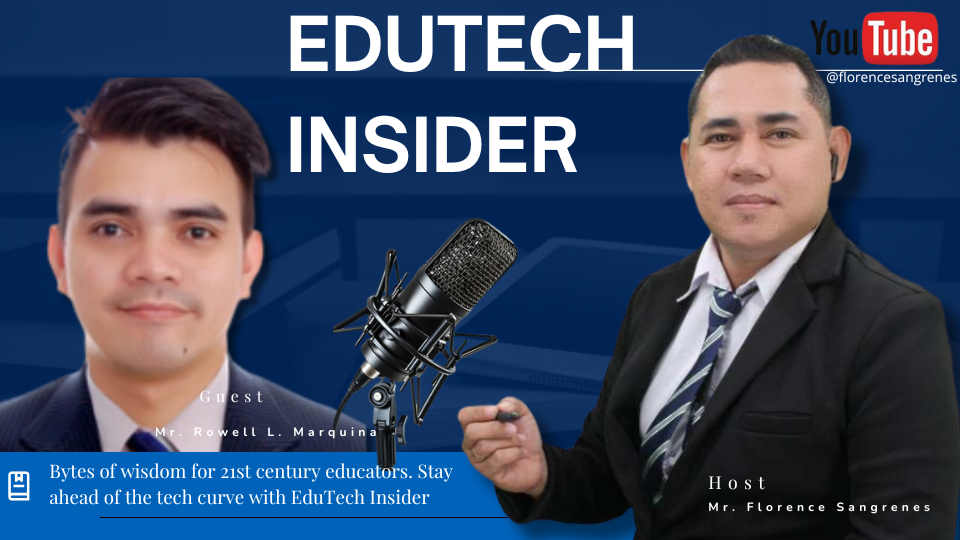


I
recently had the privilege of speaking with Sir Rowell Marquina, a seasoned IT
educator with over 20 years of experience.
Currently a lecturer at PUP Binan Campus, Sir Rowell specializes in Information
Assurance, Application Development, Web Design, and Emerging Technologies. He
is also a Google Certified Educator, Microsoft Certified Educator, and a
ViewSonic Philippines Ambassador. Our conversation was a treasure trove of
insights about the challenges and opportunities in IT education, the role of AI
in the classroom, and how teachers can adapt to the rapid pace of technological
advancements.
Sir
Rowell's journey into the world of education began with a deep admiration for
his father, who was also a teacher. Growing up in a
classroom environment, he witnessed firsthand the respect and admiration his
father received from students. This inspired him to pursue a career in
teaching, despite the lucrative opportunities available in the IT industry.
Over the years, he has taught in various institutions, including high schools
and colleges, before settling at PUP Binan Campus in 2023.
What sets Sir Rowell apart is his ability to bring real-world industry
experience into the classroom. Having worked in the IT industry, he shares
practical insights with his students, preparing them for the challenges they
will face in their careers. His teaching philosophy is rooted in bridging the
gap between theoretical knowledge and practical application, ensuring that his
students are well-equipped for the workforce.
One
of the most compelling parts of our conversation was Sir Rowell's perspective
on the role of Artificial Intelligence (AI) in education. While many educators view AI with skepticism, fearing it might
replace traditional teaching methods, Sir Rowell sees it as a powerful tool to
enhance learning. He believes that AI can help teachers save time on
administrative tasks, such as creating quizzes and lesson plans, allowing them
to focus more on building relationships with students and improving their
teaching strategies.
Sir Rowell shared several examples of how AI tools like ChatGPT, Brisk, and
Gemini can be integrated into the classroom. For instance, he demonstrated
how Brisk can generate a 20-item quiz on complex topics like intermolecular
forces in just five seconds. This not only saves time but also ensures that the
questions are aligned with higher-order thinking skills. However, he emphasized
the importance of reviewing AI-generated content to ensure its accuracy and
relevance.
As
technology continues to evolve, Sir Rowell highlighted the need for educators
to adapt and upskill themselves. He pointed out
that students today are digital natives, growing up in an environment where
technology is an integral part of their lives. To effectively engage with these
students, teachers must embrace new tools and methodologies.
One of the key takeaways from our conversation was the importance of mindset.
Sir Rowell likened AI to a washing machine—a tool designed to make life easier,
not to replace human effort. He encouraged teachers to view AI as an ally
rather than a threat, using it to enhance their teaching methods and free up
time for more meaningful interactions with students.
Despite
the many benefits of AI, Sir Rowell acknowledged the challenges it presents. One of the primary concerns is the potential for misuse, such as
students using AI to generate essays or complete assignments without truly
understanding the material. To address this, he suggested incorporating
activities that require personal input, such as relating topics to personal
experiences or providing feedback on AI-generated content.
Another challenge is the digital divide, particularly in regions with limited
internet access. Sir Rowell emphasized the need for government intervention
to bridge this gap, ensuring that all students and teachers have access to the
tools and resources they need. He also highlighted the importance of raising
awareness about the ethical use of AI and providing training for educators to
maximize its potential.
While
AI offers numerous advantages, Sir Rowell firmly believes that it can never
replace the human element in teaching. He shared a
powerful example from one of his seminars, where he demonstrated the concept of
social engineering by interacting with a seasoned teacher. This hands-on
approach not only made the lesson more engaging but also highlighted the unique
value that human teachers bring to the classroom.
According to Sir Rowell, the key to staying relevant as an educator is to
continuously develop skills that AI cannot replicate. These include
emotional intelligence, humor, and the ability to build meaningful
relationships with students. By focusing on these strengths, teachers can
ensure that they remain indispensable, even in an AI-driven world.
My
conversation with Sir Rowell Marquina was both enlightening and inspiring. His insights into the evolving landscape of education and
technology underscored the importance of adaptability, continuous learning, and
the human touch. As we navigate the challenges and opportunities presented by
AI, his advice serves as a valuable guide for educators striving to make a
lasting impact in their students' lives.
In a world where technology is advancing at an unprecedented pace, Sir Rowell's
message is clear: embrace change, leverage tools like AI to enhance your
teaching, and never lose sight of the human element that makes education truly
transformative.
0 comments